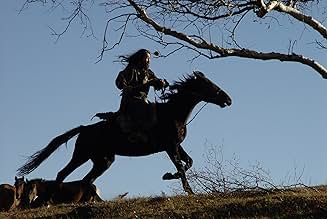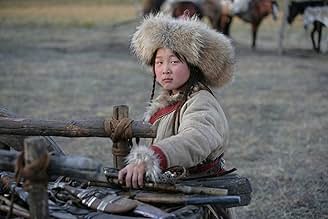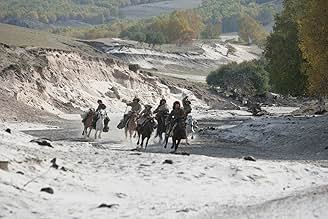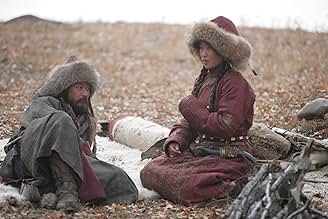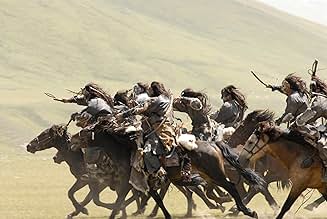The story recounts the early life of Genghis Khan who was a slave before going on to conquer half the world in 1206.The story recounts the early life of Genghis Khan who was a slave before going on to conquer half the world in 1206.The story recounts the early life of Genghis Khan who was a slave before going on to conquer half the world in 1206.
- Nominated for 1 Oscar
- 16 wins & 13 nominations total
Liya Ai
- Oelun - Temudjin's Mother
- (as Aliya)
Baasanjav Mijid
- Esugei - Temudjin's Father
- (as Ba Sen)
Ayuur
- Sorgan-Shira
- (as A You Er)
Huntun Batu
- Altan
- (as Hong Jong Ba Tu)
Deng Ba Te Er
- Daritai
- (as E Er Deng Ba Te Er)
Su Ya La Su Rong
- Girkhai
- (as Su You Le Si Ren)
- Director
- Writers
- All cast & crew
- Production, box office & more at IMDbPro
Featured reviews
To the above two comments.
You know how they say history was written by the victors? That's true for everyone but the Mongols. Most of their history was written by the Chinese, Russians, Arabs, and other conquered peoples who had an interest in perpetuating Genghis Khan = bloodthirsty savage.
The movie is based on one of the few sources about Genghis khan written in Mongolian. It's called the secret history of the Mongols and was written shortly after he died as a record for the Mongolian royal family. He was just a chieftain's's son of a very minor tribe. That's what makes this story so impressive, he didn't start out as a king or a prince with a huge army, like Alexander. Everything he had, he had to earn. He didn't get to be Genghis Khan until he was in his 30's. He was always aware of how victory wasn't assured but had to be paid for with planning and strategy. He wasn't a saint by any means but he wasn't an unthinking savage. This movie is actually meant to be the first in a trilogy with the second one probably detailing his conquest of north china and the third the conquest of the Khwarezim empire in Iran and Afghanistan.
This is an approach that I like because the Alexander movie died on account of it trying to condense all of his conquests into one movie.
You know how they say history was written by the victors? That's true for everyone but the Mongols. Most of their history was written by the Chinese, Russians, Arabs, and other conquered peoples who had an interest in perpetuating Genghis Khan = bloodthirsty savage.
The movie is based on one of the few sources about Genghis khan written in Mongolian. It's called the secret history of the Mongols and was written shortly after he died as a record for the Mongolian royal family. He was just a chieftain's's son of a very minor tribe. That's what makes this story so impressive, he didn't start out as a king or a prince with a huge army, like Alexander. Everything he had, he had to earn. He didn't get to be Genghis Khan until he was in his 30's. He was always aware of how victory wasn't assured but had to be paid for with planning and strategy. He wasn't a saint by any means but he wasn't an unthinking savage. This movie is actually meant to be the first in a trilogy with the second one probably detailing his conquest of north china and the third the conquest of the Khwarezim empire in Iran and Afghanistan.
This is an approach that I like because the Alexander movie died on account of it trying to condense all of his conquests into one movie.
Astonishingly, the name and the person of Genghis Khan in Sergei Bodrov's "Mongol," a great, Shakespearean drama about this seminal figure in history, don't appear until the very end of the two-hour epic. Instead, we see Temudjin, the man yet to become (posthumously) Khagan (emperor) of what was to be for several centuries the largest contiguous empire in history. Whether Bodrov completes the contemplated two additional chapters of the story or not, "Mongol" stands on its own as a masterpiece.
Contradicting the Western (and Russian) image of Genghis as the monstrous conqueror, Bodrov's work is influenced by Lev Gumilev's "The Legend of the Black Arrow" and is based on "The Secret History of the Mongols," the 13th century Mongolian account, unknown until its re-emergence in China 700 years later. For a director, who learned in school only about the horrors of Russia's 200-year subjugation by the Mongols, taking a "larger view" is a remarkable act.
Unlike Omar Sharif in the 1965 Henry Levin "Genghis Khan" or Takashi Sorimachi in Shinichiro Sawai's disappointing 2007 "To the Ends of the Earth and Sea," Tadanobu Asano in Bodrov's film is strictly Temudjin, not the great Khan. He lived from 1162 to 1227, and "Mongol" covers the years between 1171 and the beginning of the unification of Mongolian tribes around the turn of the century.
In fact, the spookily powerful child Temudjin (Odnyam Odsuren) dominates the first part of the film, undergoing trials and tribulations that make the lives of Dickens' abused and imperiled children look like a picnic. From age nine into his 30s, Temudjin was orphaned, hunted, imprisoned, enslaved, and constantly threatened by extinction. Literally alone in the vast landscape (brilliantly photographed by Rogier Stoffers and Sergei Trofimov), Temudjin escapes death repeatedly, at times almost mysteriously.
"Mongol" is huge - with endless vistas and epic crowd scenes, quite without special effects - but Bodrov keeps the setting just that, never strutting visuals for their own sake. The film is about people, and the cast is magnificent. Asano's face and eyes hold attention, and make the viewer experience simultaneous feelings of getting to know the character he plays and being held at arm's length. Bodrov and Asano escape all the many Hollywood pitfalls in making an epic - they present nothing easy, predictable, trite. The term "Shakespearean" is used here advisedly.
The Mongolian actors are sensational: Khulan Chuluun is luminous as Borte, Temudjin's wife; Borte's 10-year-old self, the girl who chooses Temudjin, then 9, while he thinks he is the one making the decision, is unforgettable, even if the name is hard to remember: Bayertsetseg Erdenebat.
Chinese actors are vital to the film. As Temudjin's father (poisoned by Tatars before the boy reached 10), Sai Xing Ga makes an impression few actors can achieve in such a brief appearance. Nearly overshadowing Asano is the grand thespian exercise from Sun Hong-Lei, as Temudjin's all-important blood brother Jamukha. Sun is almost too big for the big screen, perhaps a less intense performance would have served the film better.
Another problem is near the end of "Mongol," with Borte's stranger-than-fiction (and actually fictional) rescue of Temudjin from a Tangut prison, years, hundreds of miles, and impossible alliances and dalliances telescoped into a few near-incongruous minutes - all to cover a 10-year-long gap in Genghis' history. Except for that, however, Bodrov's work is engrossing, spectacular, and memorable.
Contradicting the Western (and Russian) image of Genghis as the monstrous conqueror, Bodrov's work is influenced by Lev Gumilev's "The Legend of the Black Arrow" and is based on "The Secret History of the Mongols," the 13th century Mongolian account, unknown until its re-emergence in China 700 years later. For a director, who learned in school only about the horrors of Russia's 200-year subjugation by the Mongols, taking a "larger view" is a remarkable act.
Unlike Omar Sharif in the 1965 Henry Levin "Genghis Khan" or Takashi Sorimachi in Shinichiro Sawai's disappointing 2007 "To the Ends of the Earth and Sea," Tadanobu Asano in Bodrov's film is strictly Temudjin, not the great Khan. He lived from 1162 to 1227, and "Mongol" covers the years between 1171 and the beginning of the unification of Mongolian tribes around the turn of the century.
In fact, the spookily powerful child Temudjin (Odnyam Odsuren) dominates the first part of the film, undergoing trials and tribulations that make the lives of Dickens' abused and imperiled children look like a picnic. From age nine into his 30s, Temudjin was orphaned, hunted, imprisoned, enslaved, and constantly threatened by extinction. Literally alone in the vast landscape (brilliantly photographed by Rogier Stoffers and Sergei Trofimov), Temudjin escapes death repeatedly, at times almost mysteriously.
"Mongol" is huge - with endless vistas and epic crowd scenes, quite without special effects - but Bodrov keeps the setting just that, never strutting visuals for their own sake. The film is about people, and the cast is magnificent. Asano's face and eyes hold attention, and make the viewer experience simultaneous feelings of getting to know the character he plays and being held at arm's length. Bodrov and Asano escape all the many Hollywood pitfalls in making an epic - they present nothing easy, predictable, trite. The term "Shakespearean" is used here advisedly.
The Mongolian actors are sensational: Khulan Chuluun is luminous as Borte, Temudjin's wife; Borte's 10-year-old self, the girl who chooses Temudjin, then 9, while he thinks he is the one making the decision, is unforgettable, even if the name is hard to remember: Bayertsetseg Erdenebat.
Chinese actors are vital to the film. As Temudjin's father (poisoned by Tatars before the boy reached 10), Sai Xing Ga makes an impression few actors can achieve in such a brief appearance. Nearly overshadowing Asano is the grand thespian exercise from Sun Hong-Lei, as Temudjin's all-important blood brother Jamukha. Sun is almost too big for the big screen, perhaps a less intense performance would have served the film better.
Another problem is near the end of "Mongol," with Borte's stranger-than-fiction (and actually fictional) rescue of Temudjin from a Tangut prison, years, hundreds of miles, and impossible alliances and dalliances telescoped into a few near-incongruous minutes - all to cover a 10-year-long gap in Genghis' history. Except for that, however, Bodrov's work is engrossing, spectacular, and memorable.
'Mongol,' the Russian-directed semi-historical epic (big emphasis on the semi- here) shot for $20 million in China (and Mongolia and Kazhakistan) with a multi-national cast and crew and Japanese and Chinese stars, purports to depict the first thirty-five years of the life of the emperor Genghis Khan. I say "purports," because not much is known of this period and even in depicting legend, Bodrov chooses to leave out many of the essential connectives that make a good story (or fairy tale or legend). Temudjin, as the young super-Khan is called, is a yoked prisoner, for example, awaiting execution; then, inexplicably, the yoke is off and he's free. He sinks through thin ice deep into the frozen water below; then, inexplicably, he's lying on land and getting rescued. He is languishing in a Chinese prison--his face seeming to acquire a patina of dust and sand (I liked that part: Bodrov excels at faces and tableaux); then he's miraculously found by his faithful wife Borte. She throws him a key and sets him free. Then, inexplicably, he is leading a vast army to defeat his arch rival. Over and over, how we get from point A to point B is left on the cutting-room floor. This is enjoyable as spectacle but unsatisfying from other standpoints.
How Genghis Khan got to be Genghis Khan, in short, is one thing this movie doesn't begin to try to explain. Could anyone? That I don't know; but 'Mongol' presents its biographical narrative without the connectives that make sense of a life. Despite lots of dramatic scenes with snappy dialog, striking images, and above all computer-assisted battles with crunching bones and crackling arrows and ringing swords, the film has an epic style without epic themes because its great issues are not so much resolved as abruptly, magically removed. This may in fact be more an epic love story than anything else. It is that in the backhanded way the 'Odyssey' is a love story, because, though Temudjin is away from Borte a lot of the time as Odysseus is mostly away from Ithaka and Penelope, 'Mongol's' opening sequence gives Borte a primary importance, because she (as played by Bayertsetseg Erdenebat), belonging to another tribe, a liberated young woman of the twelfth century, isn't chosen by but chooses Temudjin when he's nine years old and she's ten. It's not supposed to be that way--and maybe it wasn't; it seems a bit implausible. Temudjin is traveling with his Khan (tribal chieftain) father (Ba Sen) on their way to placate another tribe by choosing the boy's wife from their girls. When they don't, the father is promptly poisoned by the other tribe. And its leader, Targutai (Amadu Mamadakov), vows to kill Temudjin--but not for a year or so, because "Mongols don't kill children."
Well, what Mongols do or don't do seems up for grabs, and probably at the time, historically, "Mongol" itself must have been a rather vague concept. In fact that is another running theme: what's a Mongol? What are their primary values? There is no satisfactory answer, though killing and stealing are advanced as major concepts.
Surprisingly, since not too many are "to the right of Genghis Khan," and since he succeeds in wiping out all his enemies, Temudjin as played (as an adult) by the imposing Tadanobu Asano is a gentle-faced, zen-like fellow who's a strong advocate of fair play. Tadanobu, along with the somewhat over-histrionic Chinese actor Honglai Sun as Jamukha, his childhood blood brother and eventual arch rival, are both impressive. But the real star, with some substantial help from computer-generated effects, is the vast landscape of steppe, snow, mountain, and sky that dominates many scenes. With effective use of lenses and light, the filmmakers have created an epic look, and it's this, plus the authoritative acting, that make this film worth viewing--but only if you like this kind of thing and if you don't mind that you're not going to emerge from it with any historical knowledge. Said to be the first of a trilogy. One will approach the sequels with a certain reserve.
Shown as part of the San Francisco International Film Festival April-May 2008 and in US theatrical release June 2008.
How Genghis Khan got to be Genghis Khan, in short, is one thing this movie doesn't begin to try to explain. Could anyone? That I don't know; but 'Mongol' presents its biographical narrative without the connectives that make sense of a life. Despite lots of dramatic scenes with snappy dialog, striking images, and above all computer-assisted battles with crunching bones and crackling arrows and ringing swords, the film has an epic style without epic themes because its great issues are not so much resolved as abruptly, magically removed. This may in fact be more an epic love story than anything else. It is that in the backhanded way the 'Odyssey' is a love story, because, though Temudjin is away from Borte a lot of the time as Odysseus is mostly away from Ithaka and Penelope, 'Mongol's' opening sequence gives Borte a primary importance, because she (as played by Bayertsetseg Erdenebat), belonging to another tribe, a liberated young woman of the twelfth century, isn't chosen by but chooses Temudjin when he's nine years old and she's ten. It's not supposed to be that way--and maybe it wasn't; it seems a bit implausible. Temudjin is traveling with his Khan (tribal chieftain) father (Ba Sen) on their way to placate another tribe by choosing the boy's wife from their girls. When they don't, the father is promptly poisoned by the other tribe. And its leader, Targutai (Amadu Mamadakov), vows to kill Temudjin--but not for a year or so, because "Mongols don't kill children."
Well, what Mongols do or don't do seems up for grabs, and probably at the time, historically, "Mongol" itself must have been a rather vague concept. In fact that is another running theme: what's a Mongol? What are their primary values? There is no satisfactory answer, though killing and stealing are advanced as major concepts.
Surprisingly, since not too many are "to the right of Genghis Khan," and since he succeeds in wiping out all his enemies, Temudjin as played (as an adult) by the imposing Tadanobu Asano is a gentle-faced, zen-like fellow who's a strong advocate of fair play. Tadanobu, along with the somewhat over-histrionic Chinese actor Honglai Sun as Jamukha, his childhood blood brother and eventual arch rival, are both impressive. But the real star, with some substantial help from computer-generated effects, is the vast landscape of steppe, snow, mountain, and sky that dominates many scenes. With effective use of lenses and light, the filmmakers have created an epic look, and it's this, plus the authoritative acting, that make this film worth viewing--but only if you like this kind of thing and if you don't mind that you're not going to emerge from it with any historical knowledge. Said to be the first of a trilogy. One will approach the sequels with a certain reserve.
Shown as part of the San Francisco International Film Festival April-May 2008 and in US theatrical release June 2008.
This film is an example of an extremely strong narrative accompanied by excellent cinematography and superbly executed war scenes... reminds me of Saving Pvt Ryan without all the bangs and clatter. The acting is also commendable. There seems to be a great deal of research that has gone into the subject and is a great eduction on the early life of Chengiz Khan. I wish there was more, but for the integrity of the subject I think the makers have done justice to the story. Would really appreciate if this made into a trilogy, but I don't think the film makers have left any scope to stretch it further. They have compressed a epic life tale into a little more than an hour and a half and with great flair and ease which is calls for a standing ovation. Lesson to Indian Film makers!!!
While the plot contained some dubious twists and had rather strange and slow pacing, the overall effect of this movie is stellar. The cinematography rivals, while being similar to, movies such as "Crouching Tiger, Hidden Dragon". The score was amazing. The acting was, to my English speaking eyes and ears, convincing. The few combat scenes were filmed and choreographed to great effect. I am not sure how historically accurate this movie is, but it works as an enchanting piece of cinema. Highly recommended to anyone who likes art films and historical epics. Seriously, the locations make me want to take a vacation to the steppes immediately.
Did you know
- TriviaDirector Sergei Bodrov and Production Designer Dashi Namdakov visited Mongolia's chief shaman in the capital city of Ulan Bator, so that they could ask permission to film a movie about Genghis Khan's life. The shaman told them that of all the people who have talked about making such a film, they were the only ones to ask his permission.
- GoofsThe Mongolian tribes, including the hordes that conquered their vast empire, rode on a very peculiar race of horses, stocky build, with relatively short legs and a large head. The horses used in the movie look like ordinary western horses
- ConnectionsFeatured in The 80th Annual Academy Awards (2008)
- SoundtracksBeginning
Composed By Tuomas Kantelinen
Performed by Hamburg Film Orchestra, The London Session Orchestra, One Orchestra, Altan Urag
© 2008 X-Filme Creative Pool GmbH.
(p) 2008 Kinofabrika GmbH & Tuomas Kantelinen Ensemble.
Details
- Release date
- Countries of origin
- Languages
- Also known as
- Mongol: The Rise of Genghis Khan
- Filming locations
- Inner Mongolia, China(location)
- Production companies
- See more company credits at IMDbPro
Box office
- Budget
- $18,000,000 (estimated)
- Gross US & Canada
- $5,705,761
- Opening weekend US & Canada
- $135,326
- Jun 8, 2008
- Gross worldwide
- $26,527,510
- Runtime
- 2h 6m(126 min)
- Color
- Sound mix
- Aspect ratio
- 2.35 : 1
Contribute to this page
Suggest an edit or add missing content







